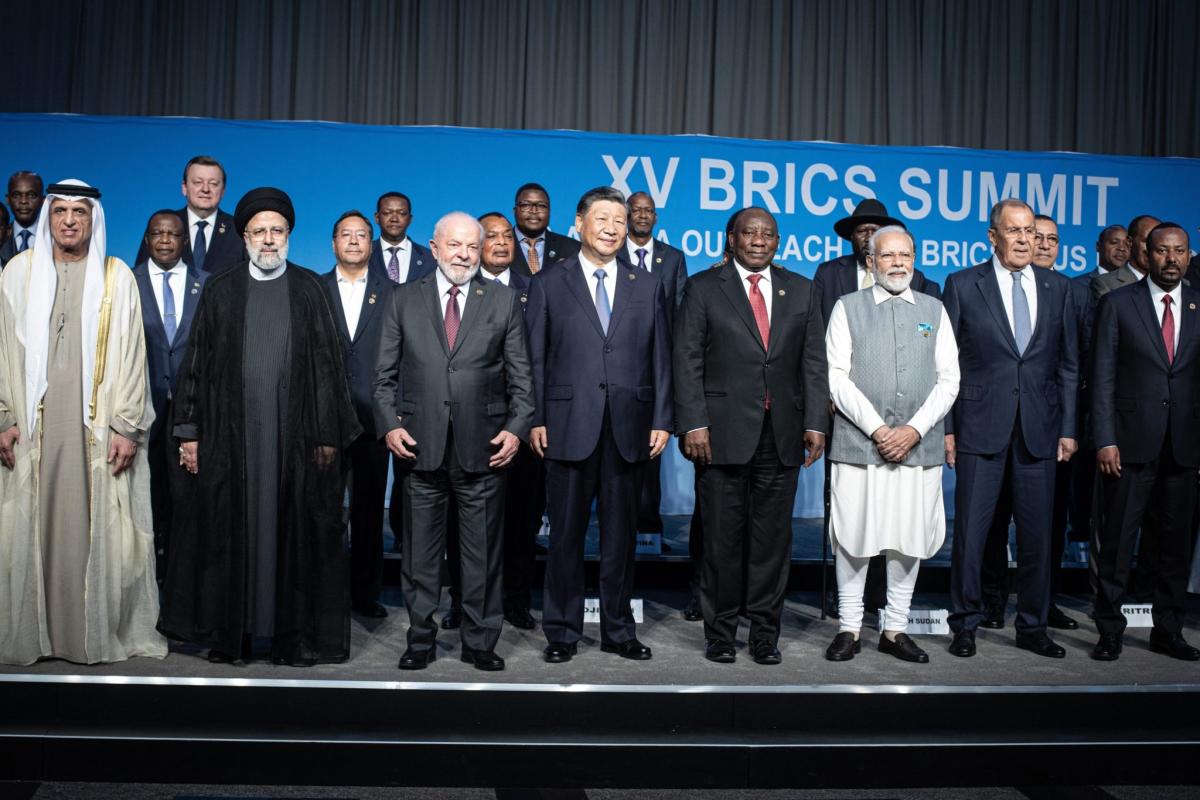BRICS seeks to expand its membership and become a champion of the "Global South," with over 40 countries expressing interest in joining the bloc to challenge Western dominance and address grievances related to abusive trade practices and neglect of poorer nations' development needs, among others. However, observers note that BRICS has a limited track record and may struggle to deliver on expectations.
South African President Cyril Ramaphosa supports expanding the Brics group of emerging market powers and believes an expanded Brics would represent a diverse group of nations that share a common desire for a more balanced world order.
The BRICS alliance could gain control of the majority of the world's oil and gas trade by including Saudi Arabia and the United Arab Emirates, which could lead to a shift away from the USD and the de-dollarization of the oil economy.
The Brics economic group, consisting of Brazil, Russia, India, China, and South Africa, is discussing the possibility of expanding its membership and promoting the use of local currencies for trade settlement, with aims to challenge the dominance of the US dollar, but analysts believe that the greenback is unlikely to lose its status as the international reserve currency.
The BRICS nations have caught up with the G7 in terms of collective GDP, but still lag behind in terms of GDP per capita, according to the IMF.
Indian Prime Minister Narendra Modi expressed his support for the expansion of BRICS membership, while Chinese President Xi Jinping called for the process to be accelerated, potentially boosting the group's global influence and countering the dominance of the Group of Seven. Several nations have shown interest in joining, with China taking the lead in pushing for expansion. However, India has advocated for a cautious approach due to concerns that the bloc may become influenced by its neighbor.
Six new countries, including Argentina, Iran, the United Arab Emirates, Saudi Arabia, Ethiopia, and Egypt, have become members of the BRICS alliance, as announced by South African President Cyril Ramaphosa during the summit.
South Africa's finance minister says that the BRICS grouping will not replace international payment systems like SWIFT but will explore creating one that strengthens trade in local currencies.
The BRICS expansion, featuring six new members including Saudi Arabia, Iran, Ethiopia, Egypt, Argentina, and the United Arab Emirates, will slightly increase the group's share of global GDP, population, oil production, and global exports.
The BRICS summit is aiming to reduce reliance on the U.S. Dollar, as the coalition confirms new members including UAE, Egypt, Ethiopia, Saudi Arabia, and Argentina, and discusses the possibility of a new payment system and currency backed by gold.
The BRICS alliance has inducted six new countries into the bloc during the summit in Johannesburg, and South Africa's President Cyril Ramaphosa has confirmed that a second phase of expansion will follow in the coming months.
BRICS is considering making local currencies the only accepted form of payment for oil and gas settlements, which could potentially shift global power from the West to the East.
The BRICS 2023 Summit saw the expansion of the alliance with the addition of six countries, potentially leading to a shift in the global economic order and significant de-dollarization efforts, while notable absences by Vladimir Putin and Chinese President Xi Jinping raised concerns, and China and India made progress in their border talks.
The BRICS nations are divided on the issue of de-dollarization, as statements from the bloc's leaders indicated, despite discussions about the creation of a common currency to rival the US dollar.
The expansion of BRICS to include Iran, Saudi Arabia, Egypt, Ethiopia, Argentina, and the United Arab Emirates will make the bloc represent 46 percent of the world population and 37 percent of global GDP, but China's economic dominance within the group raises questions about whether it will truly be an "equal partnership."
The BRICS' economic output represents over 40% of the world's population and is predicted to reach 40% of global GDP by 2040, but skepticism remains about their effectiveness as a bloc due to differences in economic policy, China's dominant role, and conflicts among member countries.
The BRICS expansion and their de-dollarization efforts have been met with a relatively calm response from the US, Germany, and the European Union, emphasizing the importance of countries choosing partnerships based on their national interests.
The BRICS bloc, which has now expanded to include 11 countries, controls 30% of the global economy, 46% of the world's population, and a significant share of commodities such as manganese, graphite, nickel, and copper, as well as 42% of the global oil supply, potentially putting pressure on the US economy and challenging the traditional world order.
Leaders from Brazil, Russia, India, China and South Africa recently announced that Saudi Arabia, along with five other nations, would be invited to join the BRICS organization, potentially causing fears of economic catastrophe in the U.S., although experts argue that this scenario is highly unlikely.
The BRICS group invited six new members, including Saudi Arabia and the United Arab Emirates, indicating a move towards energy dominance and diversification, but internal divides and strategic rivalries within the bloc may hinder its ability to challenge the current global energy order.
The BRICS bloc, including countries like India, China, and Russia, is slowly reducing its dependency on the US dollar and using their local currencies for trade, which could potentially weaken the US dollar's position as the dominant global currency.
